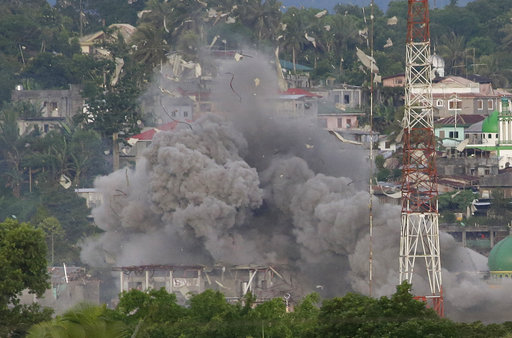
AP FILE PHOTO
President Rodrigo Duterte said on Tuesday that he would order the “carpet bombing” of Marawi to put an end to the fighting between government forces and Islamic State-inspired terrorists in the city, now in its fifth week.
Speaking to the reporters in Cagayan de Oro City, Mr. Duterte said the terrorists were apparently prepared for battle in the city, stockpiling guns and munitions in buildings as early as three years ago.
“As early as last year, it was already difficult to enter Marawi … You don’t invade it with men. You really crush it with bombs,” Mr. Duterte said.
“I will not put the soldiers at high risk. If I have to bomb the … if I have to flatten the place, I will do it. And I will take full responsibility for it,” he added.
‘I will destroy everything’
“I will order the bombing … carpet already, carpet ah … I will really destroy everything,” he said.
“And I will really do that because I have a bigger responsibility and that is to the Republic of the Philippines,” he added.
The crisis began on May 23 when gunmen from the Maute terrorist group and their allies from the Abu Sayyaf bandit group rampaged through Marawi.
The fighting erupted after a failed military attempt to capture Isnilon Hapilon, an Abu Sayyaf leader who had pledged allegiance to the Islamic State (IS) jihadist group in Iraq and Syria.
As of Tuesday, the government said, 360 people have died in the fighting—268 terrorists, 66 soldiers and policemen, and 26 civilians.
The fighting has left most of the lakeside city in ruins and forced most of its 200,000 residents to flee to Iligan City and other surrounding areas.
Visiting the evacuees in Iligan on Tuesday, Mr. Duterte apologized to them for the devastation of their city.
“I have apologized to the Maranaos, for those who died unnecessarily, and for the loss of properties and those who said that they are … [I] ask your pardon,” he said.
Communal war
Mr. Duterte also warned that if the violence in Marawi spilled over to other parts of Mindanao, Christians would arm themselves and a civil or communal war could ensue between Christians and Muslims.
“If there’s civil war, there would be killings. Here in Mindanao, there are more Christians and they have better guns. They are buying. The rich ones, they’re stockpiling guns,” he said.
“That’s what’s dangerous. To prevent a communal war, we really need to stop this … I did not expect [the number] of our casualties to be this high,” Mr. Duterte said, referring to the government losses in Marawi.
In a communal war, he said, the military would have to deal with not just the Maute terrorists but also with armed Christians.
The President said the country’s hope in ending the violence in Mindanao lay in expediting the peace process with the Moro Islamic Liberation Front (MILF) and the Moro National Liberation Front (MNLF).
Once the peace process proceeds, he will tell the MILF to deal with the Maute rebels and their Abu Sayyaf allies, he said.
“That is why [we] hope there is fast-tracking [of] the peace process. I will tell (MILF chair) Murad (Ebrahim) and the MI(LF), ‘You take care of that since that is the area you want—central Mindanao, Lanao, Cotabato, Sultan Kudarat,” Mr. Duterte said.
Cornered
The military said on Wednesday that troops had cornered the terrorists in Marawi.
“They’re running out of place to run,” said Brig. Gen. Ramiro Manuel Rey, the commander of the military’s Task Force Ranao.
Rey said the terrorists’ resistance continued to weaken, although they could still engage government troops in occasionally heavy fighting.
Lt. Col. Jo-Ar Herrera, spokesperson for the Army’s 1st Infantry Division, also said the terrorists’ resistance was “waning.”
“We continue to recover and control strategic areas in the cleared area and the enemy resistance is waning, their controlled area diminishing,” he said.
Herrera said, however, that none of the leaders of the Maute terror group—brothers Omarkhayam and Abdullah Maute—and of the Abu Sayyaf had been confirmed killed in the fighting.
“They are still in the area, based on our monitoring and reports we get,” he said. —With reports from Allan Nawal and Richel Umel

